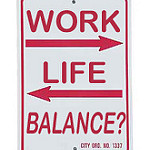Whether you are a long-time freelancer or just starting an adventure with self-employment, there are a few things you can expect. Some are positive, like independence and a sense of responsibility for what you do. Others can become a problem if you don’t pay enough attention to them: fatigue, burnout, too little time and too much work. Or you have a long to-do list and you know you could make it, but something always gets in the way. There is always something to detach you from work: unplanned business trip, an illness, an equipment failure, or an unexpected visit. The reasons might be mutltifold. The thing with being a freelancer is that since you don’t work steady hours, your schedule is much less predictable and maintaining work-life balance may be challenging. You get to be so preoccupied with work that you don’t have any time for other activities.
The idea behind the work-life balance is not to divide your time equally for your professional and personal activities. It is more about achieving satisfaction in all areas of your life. The ability to combine work, family and passion to create a complementary whole may seem like a dream, but it’s worth trying to make it happen.

Photo credit: CWA Union on Visualhunt / CC BY-NC-SA
Is there a reason to worry?
Studies have shown that the conflict between work and private life carries a number of negative consequences for the employee, their family and –in the long run – for the quality of their work. Therefore, it’s worthwhile to ask yourself a few questions:
- Do you work for more than 40 hours a week?
- Do you often find yourself thinking about work or actually working during your family time?
- Does thinking about work-related matters keep you up at night?
- Do you often feel so exhausted after work that you don’t have the energy for anything?
- Do you sometimes get work-related phone calls late in the evening or when on holiday?
- Is it becoming more and more difficult to find time for your hobbies?
- Do you have trouble remembering when was the last time you took some time off?
If you answered “yes” to most of the questions, the ability to maintain a work-life balance might not be your strongest asset. High chances are that soon your personal life might suffer as a consequence. This imbalance can also negatively affect your health causing nervousness and tension, headaches, weight loss or even depression.
Fighting for work-life balance
Make a realistic schedule and stick to it
It can be a anything, a simple notebook, a phone app, some desktop software or a calendar. The most important thing is that you won’t make the mistake many freelancers make and won’t add too many items to the list. Take into account your daily responsibilities such as shopping, picking up children from kindergarten, etc. Domestic duties are time-consuming, but many people forget about them when planning a day.
This method will allow you to check how much time you have left for work and adjust the number of tasks you engage in. Try not to overload your calendar and always leave a margin for a new project that can appear.
Be assertive and learn to say “no”
Regardless of their language pair, this may well be the most difficult word for a freelance translator, but it’s worth to learn to use it.
It is not just about refusing to take on new project from your clients. Saying “no” can also mean putting your foot down when it comes to distractions that interfere with your schedule. This can be too frequent get-togethers with friends, or taking over a greater part of household duties kust because you work remotely.
Don’t accept new gigs if their deadlines overlap with your current projects. It will mean twice as much work at the same time to finish both jobs on time. If you know next month you are busy, it’s safe to let some of the new tasks go.
Change your surrounding
You probably already arranged yourself a place for work. Whether it is a separate office or a work-dedicated area in your living room, that’s where you feel most comfortable. But sometimes it might be interesting to mix things up a bit. Try working from a coffee house or a library for a change, and see how it works for you. Even if it may be far from perfect, this can give you a chance to break the routine. As a result, your job will feel less monotonous and uninspiring.
Include relaxation time in your weekly schedule
Plan your free time, so that you will know exactly how you’re going to spend it. If you will arrange it ahead of time, you will have a chance to get some distance and catch a break from your professional duties. Actually putting leasure time as a separate entry in your scheduler may seem silly, but can be beneficial in the long run. Sometimes if you don’t plan your free time, you might let it slip through your fingers. If you promise yourself you’ll actually use it for something you truly enjoy, it will feel much more rewarding and will let you recharge your batteries.










